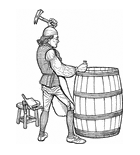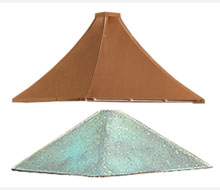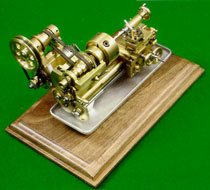Small Planet Communications, Inc. + 15 Union Street, Lawrence, MA 01840 + (978) 794-2201 + Contact







Colonial Americans were primarily farmers. Every family was expected to be self-sufficient—capable of growing crops and raising livestock for food. In addition, they spun their own thread and wool to make their clothes. They often made their own soap and candles.
There were also trades people who specialized in producing a specific product. Some occupational names were self-explanatory: locksmith, gunsmith, brickmaker, buttermaker, and broommaker, for example. There were also occupations with names that are recognizable today: coroner, bookkeeper, barber, weaver, baker, accountant, lawyer, and musician.
DID YOU KNOW?
One common origin of
surnames is based on an
ancestor's occupation,
such as Miller, Sawyer,
or Turner.
Other colonial occupations include the following:
ALEWIFE: a woman who kept an alehouse or tavern
BARBER-SURGEON: one who performed surgery and was also a haircutter; in the 18th century an act was passed that limited barbers to haircutting, shaving, dentistry, and blood-letting
BLACKSMITH: a person who worked with iron, including the making and fitting of horseshoes
BOATMAN: a person who worked on a boat, mostly on canals and rivers; a boat repairer
BREWER/BREWSTER: a person who made beer, ale, and so on from malt and hops by steeping, boiling, and fermenting
BRICKMAN/BREAKMAN: a bricklayer

A cooper is also known
as a barrel-maker.
CARDMAKER: one who made the handheld implement that was used for carding cotton and wool
CHANDLER: a person who made or sold candles; a retail dealer in groceries
COMPOSITER: a person who worked in a print shop, arranging individual letters of type by hand to form words
COOPER: a person who made or repaired barrels, wooden casks, kegs, or tubs
CORDWAINER: a shoemaker or leather worker
CURRIER: a craftsman who tanned leather with oil or grease
DRAPER: a dealer of cloths and dry goods
ENGRAVER/ETCHER: a person who cut or carved designs or lettering in metal or stone
FERRYMAN: a person who owned, managed, or worked on a ferry
FISHMONGER: a dealer in fish
FULLER: a person who shrank and thickened cloth by moistening, heating, and pressing it
DID YOU KNOW?
Coppersmiths are also known as
greensmiths because, over time,
copper develops a pale green outer
layer called a patina that protects
the copper beneath it from corrosion.
GLOVER: one who made or sold gloves
GOLDBEATER: one whose occupation was to beat gold into gold leaf
GOLDSMITH: a craftsman who made objects out of gold
GROCER: a storekeeper who sold food and various household supplies
GREENSMITH: a worker in copper or latten (a thin sheet of metal or brass)
HOUSEWRIGHT: a carpenter or builder of houses
HUSBANDMAN: a farmer
INNKEEPER: the proprietor or manager of an inn
IRONMONGER: a dealer or trader in iron
JOINER: a skilled carpenter who did interior finish work by joining pieces of wood
MARINER: a sailor
MERCER: a person who dealt in costly fabrics, such as silks
MERCHANT: an occupation that involved the buying and selling of products
MIDWIFE: a woman skilled in the birthing process who assisted other women with the birth of a child
MILLER: a person who owned or operated a flour mill
MILLWRIGHT: a planner and builder of mills or mill machinery
PORTER: a person who is stationed at a gate or door; someone who carries luggage
PRINTER: a person who owned or ran a print shop, where newspapers, pamphlets, books, and other printed matter were produced
ROPER: a person who made nets or rope
SADDLER: a person who made saddles, harnesses, horse collars, bridles, or other horse furnishings
SAWYER: a person who cut timber into logs or boards
SCHOOLMASTER: a teacher
SHIP MASTER: the commander or owner of a ship
SHIPWRIGHT: a skilled carpenter who built and repaired ships
STATIONER: a seller of books or writing items such as pencils, paper, and inkstands

A lathe, a tool used by a turner in
colonial times.
TAILOR: a person who made or repaired clothes
TANNER: a person who cured animal hides into leather
TAVERNKEEPER: the owner or manager of a tavern
TINNER: a person who worked in a tin mine (tin is a type of metal); a tinsmith
TURNER: a person who worked with a lathe
VINTNER: a wine merchant
WAGONER: a wagon driver
WAINWRIGHT: a person who built or repaired wagons
WHALER: a person who fished for whales
WHEELWRIGHT: a person who made or repaired wheels as well as wheeled vehicles such as carriages
WHITEWING: a street sweeper
WOOLCOMBER: a person who operated the machines that separated the fibers ready for spinning
YEOMAN: a farmer who owned his own land
Occupations | Bibliography
- Ancestry.com. "Colonial Occupations." Accessed 5/31/19. http://www.rootsweb.ancestry.com/~rigenweb/ocupaton.html
- The BBC. “What’s in a Name? Your Link to the Past” by Paul Blake. Accessed 5/31/19. http://www.bbc.co.uk/history/familyhistory/get_started/surnames_01.shtml
- Colonial Williamsburg. “Colonial Williamsburg Trades.” Accessed 5/31/19. https://www.history.org/almanack/life/trades/tradehdr.cfm
- Everyday Health. “The History of Last Names.” Accessed 5/31/19. https://www.everydayhealth.com/healthy-living/history-last-names
- History of the USA. Converted from Henry William Elson's History of the United States of America. The MacMillan Company, NY, 1904. "Occupations and Customs." Accessed 5/31/19. http://www.usahistory.info/colonial/customs.html
- LiveScience. "Why Does Copper Turn Green?" Accessed 5/31/19. http://www.livescience.com/32487-why-does-copper-turn-green.html
Occupations | Image Credits
- Cooper | Webster's Online Dictionary
- Copper | Cape Cod Weathervane Company
- Lathe | The Miniature Engineering Craftsmanship Museum
© 2020 Small Planet Communications, Inc. + Terms/Conditions + 15 Union Street, Lawrence, MA 01840 + (978) 794-2201 + planet@smplanet.com


